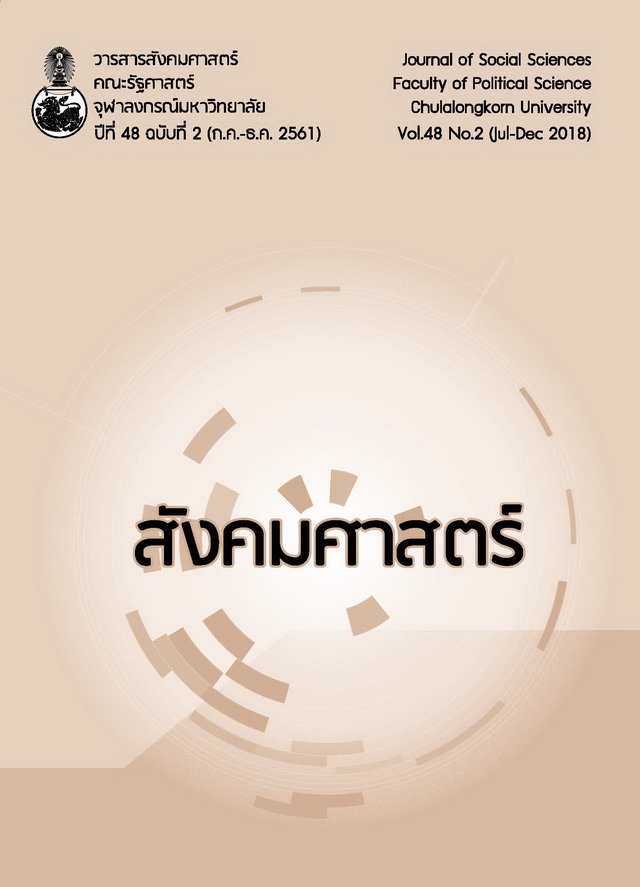การศึกษาทางการเมืองเพื่อสร้างความเป็นพลเมืองในระบอบประชาธิปไตย
DOI:
https://doi.org/10.61462/cujss.v48i2.746คำสำคัญ:
การศึกษาทางการเมือง, ความเป็นพลเมือง, ระบอบประชาธิปไตยบทคัดย่อ
การศึกษาทางการเมืองเป็นกระบวนการการเรียนรู้ของมนุษย์ที่จะส่งเสริมให้สามารถแสวงหาเอกลักษณ์ทางปัญญา วัฒนธรรม ประวัติศาสตร์ อุดมการณ์ทางการเมืองรวมทั้งยังเป็นกระบวนการของการให้ข้อมูลข่าวสาร การสร้างทักษะที่จำเป็นต่อการโต้ตอบหรือแก้ปัญหาที่เกิดขึ้นในสถานการณ์ในชีวิตจริงของแต่ละวัน เพื่อช่วยทำให้เกิดสติปัญญา มีประสิทธิภาพและมีความรับผิดชอบในระบบการเมืององค์ประกอบของการศึกษาทางการเมืองแบ่งออกเป็น 3 ประการ คือ ประการแรกความรู้ทั่วไป ได้แก่ ข้อมูลข่าวสารพื้นฐานที่เป็นเงื่อนไขจำเป็นต่อการทำความเข้าใจในมิติต่างๆทางการเมืองประการที่สองทักษะ ได้แก่ ความสามารถในการประมวลข้อมูลข่าวสารเพื่อทำการวิเคราะห์และประเมินแนวทางในการตัดสินใจทางการเมืองได้อย่างลึกซึ้ง และ ประการที่สาม ทัศนคติ ในการวิเคราะห์ข่าวสารข้อมูลทางการเมืองอย่างรอบด้านและพินิจพิจารณาให้ทั่วถ้วนลึกซึ้งก่อนที่จะเชื่อตาม หรือนำมาประกอบการตัดสินใจ การศึกษาทางการเมืองจึงต้องสอดรับกับชีวิตในสังคม สถานศึกษาจำลองหรือย่อส่วนสังคมมาไว้ในสถานศึกษา โดยจำลองแบบอย่างที่ดีงามของชีวิต โดยจัดประสบการณ์ให้เหมาะสมกับวุฒิภาวะของผู้เรียนแต่ละกลุ่มอายุ ต้องมีการสร้างบรรยากาศความเป็นประชาธิปไตยในสถานศึกษา ให้เด็กรู้จักลักษณะพื้นฐานทั่วไปของสังคม สร้างบรรยากาศให้เด็กได้มีการเรียนรู้สิ่งแปลกใหม่และมุ่งให้สังคมดีขึ้น สนับสนุนให้เกิดความร่วมมือระหว่างผู้สอนกับผู้เรียน และผู้เรียนกับผู้เรียนด้วยกัน เน้นเป้าหมายของประชาธิปไตยคือการอยู่ร่วมกันอย่างมีความสุข
Downloads
เอกสารอ้างอิง
Chai-anan Samudavanija, and Jorg M. Frohlich. 1990. Kansueksa Thang Kanmueang: Naeokhit Lae Withikan Chatkan. [Political Education: Concept and Methods of Management]. Bangkok: Institute of Public Policy Studies. (in Thai)
Hahn, Carole L. 1999. “Challenges to Civic Education in the United States.” In Civic Education Across Countries: Twenty-Four National Case Studies from the IEA Civic Education Project, edited by Judith Torney-Purta, John Schwill and Jo-Ann Amadeo. Amsterdam: International Association for the Evaluation of Educational Achievement.
Kittachet Krivart, Anujit Chinnasarn, Chalerm Gerdmoli, Sakun Wongkalasin, Chaiwat Ranglek, and Arpaporn Sookhom. 2016. Kansueksa Rupbaep Kan Hai Kansueksa Thang Kanmueang Phuea Sang Khwam Pen Phonlamueang Civic education) Nai Rabop Prachathippatai An Mi Phramahakasat Song Pen Pramuk. [A Study of the Form of Civic Education for Democratic Government with a Monarch as Head of State]. Bangkok: Civil Political Development Fund, Office of Political Development Council, King Prajadhipok’s Institute. (in Thai)
Manat Suwan, Kangsadal Kanokhong, and Surasing Saengsode. 2016. Rupbaep Kan Hai Kansueksa Thang Kanmueang Phuea Sang Khwam Pen Phonlamueang Nai Rabop Prachathippatai An Mi Phramahakasatri Song Pen Pramuk: Sueksa Korani Changwat Chiang Mai. [A Study of the Form of Civic Education for a Democratic System with a Monarch as Head of State: A Case of Chiang Mai Province]. Bangkok: Civil Political Development Fund, Office of Political Development Council, King Prajadhipok’s Institute. (in Thai)
Matto, Elizabeth C., Alison Rios Millett McCartney, Elizabeth A. Bennion, and Dick Simpson. 2017. Teaching Civic Engagement Across the Disciplines. Washington DC: The American Political Science Association.
Otsu , Kazuko, 2000. “Civic Education in Japan: Values Promotion in the School Curriculum” Asia Pacific Journal of Education 20(1): 53-62.
Parinya Tevanaroumitkul. 2012. Kansueksa Phuea Sang Phonlamueang (Civic Education). [Civic Education]. Bangkok: Nanmeebooks Publications. (in Thai)
Thipphaphon Tantisunthon. 2010. “Pai Du Civic Education Thi Yoeraman.” [Where I Went to See Civic Education in Germany]. Patirup Kanmueang-Krachai Amnat. [Political Reform-Decentralization] Institute of Public Policy Studies, Monthly Newsletter Edison Press Products Ltd. Bangken Bangkok, July: 5-7.
ดาวน์โหลด
เผยแพร่แล้ว
รูปแบบการอ้างอิง
ฉบับ
ประเภทบทความ
สัญญาอนุญาต
ลิขสิทธิ์ (c) 2018 คณะรัฐศาสตร์ จุฬาลงกรณ์มหาวิทยาลัย

อนุญาตภายใต้เงื่อนไข Creative Commons Attribution-NonCommercial-NoDerivatives 4.0 International License.
เงื่อนไขการอนุญาตสาธารณะ
นโยบายลิขสิทธิ์และการอนุญาต
วารสารสังคมศาสตร์ จุฬาลงกรณ์มหาวิทยาลัย เผยแพร่เนื้อหาทั้งหมดภายใต้ สัญญาอนุญาตครีเอทีฟคอมมอนส์แบบแสดงที่มา-ไม่ใช้เพื่อการค้า-ไม่ดัดแปลง 4.0 นานาชาติ (CC BY-NC-ND 4.0)
ลิขสิทธิ์
บทความทั้งหมดที่ตีพิมพ์ในวารสารสังคมศาสตร์ จุฬาลงกรณ์มหาวิทยาลัย เป็นลิขสิทธิ์ของ คณะรัฐศาสตร์ จุฬาลงกรณ์มหาวิทยาลัย ผู้เขียนจะโอนสิทธิ์ทั้งหมดให้แก่วารสารเมื่อบทความได้รับการตอบรับให้ตีพิมพ์
สัญญาอนุญาต CC BY-NC-ND 4.0
ภายใต้สัญญาอนุญาตนี้:
-
แสดงที่มา (BY): ผู้ใช้ต้องแสดงที่มาโดยอ้างอิงถึงผู้เขียน คณะรัฐศาสตร์ จุฬาลงกรณ์มหาวิทยาลัย และวารสารสังคมศาสตร์ จุฬาลงกรณ์มหาวิทยาลัย พร้อมทั้งให้ลิงก์ไปยังสัญญาอนุญาต และระบุหากมีการเปลี่ยนแปลง ทั้งนี้สามารถทำได้ในลักษณะที่สมเหตุสมผล แต่ต้องไม่ทำในลักษณะที่แสดงว่าผู้อนุญาตให้การรับรองผู้ใช้หรือการใช้งานดังกล่าว
-
ไม่ใช้เพื่อการค้า (NC): ผู้ใช้ไม่สามารถใช้เนื้อหาเพื่อวัตถุประสงค์ทางการค้า การใช้งานเชิงพาณิชย์จะต้องได้รับอนุญาตเป็นลายลักษณ์อักษรล่วงหน้าจากผู้เขียนและคณะรัฐศาสตร์ จุฬาลงกรณ์มหาวิทยาลัย
-
ไม่ดัดแปลง (ND): หากผู้ใช้นำเนื้อหาไปรวม ดัดแปลง หรือต่อยอด ผู้ใช้ไม่สามารถเผยแพร่งานที่ดัดแปลงนั้นได้ การดัดแปลงผลงานจะต้องได้รับอนุญาตเป็นลายลักษณ์อักษรล่วงหน้าจากผู้เขียนและคณะรัฐศาสตร์ จุฬาลงกรณ์มหาวิทยาลัย
นโยบายการเข้าถึงแบบเปิด
วารสารสังคมศาสตร์ จุฬาลงกรณ์มหาวิทยาลัย ให้การเข้าถึงเนื้อหาแบบเปิดโดยทันทีตามหลักการที่ว่าการทำให้งานวิจัยสามารถเข้าถึงได้อย่างเสรีแก่สาธารณะจะสนับสนุนการแลกเปลี่ยนความรู้ในระดับโลก ผู้ใช้สามารถอ่าน ดาวน์โหลด คัดลอก เผยแพร่ พิมพ์ ค้นหา หรือเชื่อมโยงไปยังเนื้อหาฉบับเต็มของบทความได้โดยไม่ต้องขออนุญาตล่วงหน้าจากผู้จัดพิมพ์หรือผู้เขียน ทั้งนี้เป็นไปตามสัญญาอนุญาต CC BY-NC-ND 4.0
นโยบายการเก็บบันทึกด้วยตนเอง
ผู้เขียนสามารถเก็บบันทึกบทความฉบับตีพิมพ์สุดท้าย ต้นฉบับที่ส่ง (preprint) หรือฉบับที่ผ่านการประเมิน (postprint) ในคลังสถาบันหรือเว็บไซต์ส่วนตัวได้ โดยต้องมีการอ้างอิงการตีพิมพ์ครั้งแรกในวารสารสังคมศาสตร์ จุฬาลงกรณ์มหาวิทยาลัย พร้อมระบุแหล่งอ้างอิงที่สมบูรณ์และลิงก์ไปยังเว็บไซต์ของวารสาร
การขออนุญาต
สำหรับการใช้งานนอกเหนือจากที่ครอบคลุมโดยสัญญาอนุญาต CC BY-NC-ND 4.0 กรุณาติดต่อ:
กองบรรณาธิการ
วารสารสังคมศาสตร์ จุฬาลงกรณ์มหาวิทยาลัย
คณะรัฐศาสตร์ จุฬาลงกรณ์มหาวิทยาลัย
Email: cusocscij@gmail.com
สำหรับข้อมูลเพิ่มเติมเกี่ยวกับสัญญาอนุญาตครีเอทีฟคอมมอนส์แบบแสดงที่มา-ไม่ใช้เพื่อการค้า-ไม่ดัดแปลง 4.0 นานาชาติ กรุณาเยี่ยมชม: https://creativecommons.org/licenses/by-nc-nd/4.0/deed.th





